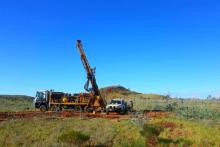Soil sampling by WA explorer Kairos Minerals has outlined two high-priority lithium targets at the company’s Wodgina project in the Pilbara. One target stretches for a lengthy 1.7km and is supported by a nearby historical sample that returned 1.6 per cent lithium oxide. The project lies less than 3km from the “world class” Wodgina lithium deposit.


Soil sampling by West Australian explorer Kairos Minerals has outlined two high-priority lithium targets at the company’s Wodgina project in the Pilbara. One target stretches for a lengthy 1.7 kilometres and is supported by a nearby historical sample that returned 1.6 per cent lithium oxide. The project lies less than three kilometres from the “world class” Wodgina lithium deposit.
The intriguing targets were revealed through analysis of 837 recently received assays from a sampling program across the company’s 100 per cent owned Wodgina tenure.
The company says both targets show lithium-caesium-tantalum, or “LCT” anomalies that are sometimes known to host lithium bearing spodumene captured in pegmatites.
LCT pegmatites are known to host significant lithium deposits around the world, including the Greenbushes mine some 250km south of Perth in WA.
Notably, Kairos’ project lies just a stone’s throw from one of the largest known hard rock lithium spodumene deposits in the world – the Wodgina lithium deposit that is owned through a joint venture between ASX-listed Mineral Resources and New York-listed chemical manufacturing company, Albemarle Corporation.
Albermarle and Mineral Resources, both of whom have multi-billion dollar market caps recently announced plans to recommence spodumene concentrate production at Wodgina in the third quarter of next year after enduring the lithium slump of the last two years that is now firmly in the rear view mirror. The operation boasts a processing capacity of 750,000 tonnes per annum of spodumene concentrate, underpinned by a 30 year plus mine life.
Kairos’ 1.7km long target anomaly returned values grading up to 293 parts per million lithium, 293ppm caesium and 78 parts per billion tantalum. Elevated levels of rubidium, indium and tungsten were also reported at the prospect.
Curiously, at the eastern end of the anomaly a historical rock chip sample taken from an area where pegmatites have been mapped by the company returned a cracking 1.6 per cent lithium oxide.
About 800m to the north, a second target area with coinciding lithium, tantalum and rubidium anomalies has been defined by Kairos. Management says aerial imagery suggests the prospect could host pegmatites.
Kairos Minerals Executive Chairman, Terry Topping, said:“We always had high hopes for the lithium prospectivity of our Wodgina Project given its location immediately adjacent to one of the world’s most significant lithium mines, which is set to restart production next year. I think it’s fair to say these early results utilising the state-of-the-art Ultrafine+ soil sampling methodology have exceeded our expectations…
These are outstanding targets for lithium exploration and will now be prioritised as part of our broader ongoing exploration efforts in the Pilbara.”
Results from about a third of the samples collected during the campaign remain pending and the company plans to conduct an extensive mapping and rock chip sampling program to better define prospective drill targets once all outstanding assays have been received.
Kairos holds more than 2,000 square kilometres of land in the Pilbara, including its Mt York gold project where a resource base of more than 873,000 ounces of contained gold has been defined. It now appears to have added lithium potential to its vast tenure located in one of the most coveted exploration regions of WA.
Is your ASX-listed company doing something interesting? Contact: matt.birney@businessnews.com.au












